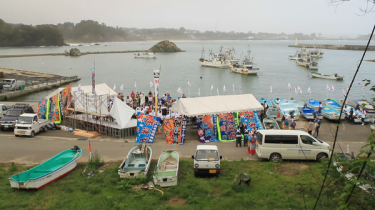JAPAN: Surfers, fishermen, and radiation
Journalist Lisa Katayama and filmmaker Jason Wishnow are documenting the lives of people dealing with radiation in a post-earthquake Japan. In We Are All Radioactive, they are including 50% footage made by themselves in the areas around Fukushima Power Plant that had a meltdown after the earthquake and tsunami in March 2011, and 50% footage made by residents who were given waterproof digital cameras so they could tell their own story on surviving the earthquake and now dealing with radiation. The story comes to us via The Laughing Squid.
Back in March 11, 2011, a 9.0 earthquake off the Pacific Coast off Tohoku struck Japan. This, the strongest ever earthquake recorded to hit Japan, and the subsequent tsunami waves of up to 40.5 meters devastated great parts of the coastal regions of the country and caused the meltdown of nuclear reactors at the Fukushima Daiichi Power Plant, irradiating the neighboring areas including the ocean waters.
Although many areas have been rebuilt and people relocated, others are struggling to return to their lives before the earthquake. For those who live to be in the water, like surfers, or those that live from the water, like fishermen, understanding how their lives may change due to radiation could be the key to their continued wellbeing.
Through crowdsourcing platform IndieGoGo, We Are All Radioactive is raising funds to release the different episodes of their web series progressively: as soon as they get enough money for one episode, they release it through their site until they complete all four episodes. Since launching their campaign, they have released the first episode, launched their website on the anniversary of the earthquake on March 11 and on March 21 they will share the second episode of the series on their site.
From their fundraising site blurb:
We Are All Radioactive combines technology, entertainment, and solid investigative journalism to provide answers to fundamental questions about radiation and the complexities of disaster response on both a political and sociological level.
Our footage also touches on the work of Architecture for Humanity, Greenpeace, Surfrider Foundation, and Safecast — all major global non-profits dedicated to helping Japan respectively with post-earthquake reconstruction, human and environmental rights, water safety, and radiation monitoring.
In the first episode of the series we meet transplanted American surfer Autumn, who visited Japan and decided to stay in Sendai. After the earthquake, she teamed up with other local surfers and fishermen to try and figure out how to rebuild lives through work on their beaches and communities.
Updates on how crowdfunding efforts are coming along and new releases are available at the projects Facebook page We Are All Radioactive. Videos and the website are in both Japanese and English, and include information such as a timeline outlining the history of Japan with Nuclear Energy and links to meet the four characters from the series: Autumn from episode 1, surfer Konno, humanitarian worker Kasahara trying to understand the effects of radiation on the community, including the life of his unborn child and an artist collective who are exploring the impacts of the disaster with risky endeavours.
This post is part of our special coverage Japan Earthquake 2011.
Written by Juliana Rincón Parra






















